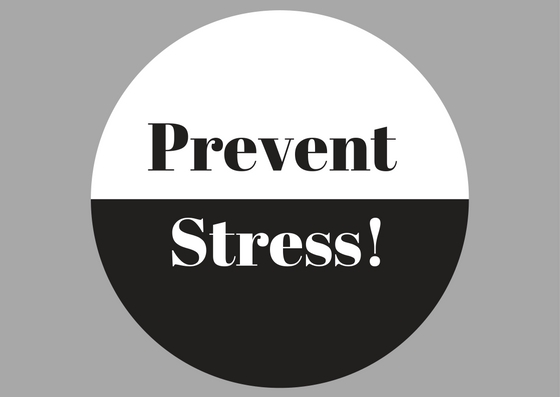I live in the United States, and everyone I speak with recently seems incredibly stressed. Mixing a contentious political environment with a high degree of uncertainty about our workplaces and economic and social environments has pushed many people to the far edge of anxiety.
And this is a global issue.
A little stress keeps you laser-focused and productive, but higher levels do long-term damage. Too much stress narrows your thinking and diminishes creativity, reducing your capacity to deal with, well, the stress! Worse yet, stress releases Cortisol into your system, keeping your body on constant alert and, if sustained, eating away at your organs and leading to disease and breakdowns.
Managing your stress is a critical skill AND you should also know how to prevent stress. The degree to which you balance your attention and energy can dramatically downshift how much stress shows up and how long it sticks around.
Adequate exercise and proper nutrition are essential to building a more resilient system. Today, however, I’m going to focus on going deeper in a few areas that are less talked about.
Four Ways to Prevent Stress by Going Deep
- Breathe Deeply. Do you appreciate how much breathing helps you? It purifies your blood and releases toxins. It can relieve pain and reduce lactic build up in your muscles. When you breathe into your core, the act massages your internal organs, relieving pressure and aiding digestion. Breathing deeply strengthens your lungs and your heart, and when done well improves your posture, which allows you to access more confidence.Best of all, every time you take a deep breath, your body always sends that extra bit of oxygen to the brain first, which slows your thinking, improves your central nervous system processing, and increases awareness and concentration.
Conversationally, breathing deeply is a powerful tool because, well, think about what you can’t do when you are taking a deep breath… talk! When you manage yourself more effectively in conversations, you reduce stress-inducing conflict and potentially eliminate the regret that accompanies reactive behavior. Breathe into your deep belly and notice that you listen better and respond more effectively.
- Drink Deeply. You’ve got enough stuff going on in your head to give you stress aplenty. But don’t forget that stress is both an
intellectual and a physical response. Besides air, water is the second most necessary element to sustaining life and a balanced body. If you’ve ever found yourself under-hydrated, you know that it feels terrible. Your mouth goes dry, you get a headache, your joints stiffen, you get cranky, and you can’t think straight.For the first 30 years of my life I suffered terribly from debilitating migraines, which finally went away when I learned how to use two powerful tools. First, I was trained in the use of biofeedback, which is essentially a controlled breathing and mindfulness-based tool. But the second thing I learned was that, under stress, I tended to stop eating and drinking, which literally shoved my body deeper into stress/survival death spiral!
The incredibly simple solution? Whenever I felt even the tiniest inkling of a headache coming on, I learned to head straight to the nearest water source and immediately drink 12 to 20 ounces of plain cool water. Giving my body enough liquid allowed it to relax out of famine mode. I’m not saying that’s always the answer, but given that our bodies are mostly water, can you see how it makes abundant sense?
- Sleep Deeply. Once you’ve taken care of air and water, sleep is the third most essential element for self-care. I have seen dozens of articles recently about how we sleep improperly today. We love our technology, but 99% of technology is mission-driven to keep us alert and engaged, not to help us nod off. We skip sleep to get “important” stuff done.We learn more every day that far more important things happen in the brain and nervous system during deep sleep. The brain uses that time to sort through the million moments of your day, get rid of the rubbish, and organize & file your long-term memories. Your body is quite busy during sleep, regenerating cells and healing the body so it’s ready for a new day. A 2016 global study found that people who sleep less than six hours a night have a 13% higher mortality rate compared with those to get 7-9 hours. Sufficient sleep has been linked to a 40% reduction in heart disease risk and a substantial improvement in life expectancy. Yet, only 16 to 20% of adult Americans say they get sufficient sleep.
Simple, though perhaps not easy: sleep for at least seven hours a night in a cool, dark room, without technology. And challenge the myth that you have to sleep less to be a superhero, supermom, super CEO. Unfortunately, the 2% of the population who have a gene that allows them to function well with less sleep are the people who tend to be glorified. If you are in the 98% and you are not getting adequate sleep, you are deliberately stressing your brain, reducing your creative output, and in the long run, killing your productivity.
- Hope Deeply. Nurture your positive emotions. Hope is having trust that The Universe is doing its work on your behalf, even if you can’t see it. The assessment of Hope is, “I believe things will get better, that something good may happen.”When you have Hope, you are predisposed to act or stay in action, even despite expectation that the action may prove futile. When you nurture hope, you can better deal with uncertainty while giving stress and despair less to work with. Hope is the emotion that sustains you till every Tomorrow.
Finally, Remember The Rule of Threes: A person can live for three weeks without food, three days without sleep or water, and three minutes without air…but only three seconds without hope.
Do This For Yourself:
Keep it simple: Breathe Deeply, Drink Deeply, Sleep Deeply, Hope Deeply; and occasionally visit the dark side, because Chocolate.
As Happiness Principle #7 reminds you: Choose to Respond. What happens is going to happen, regardless. Accept constant, discontinuous change as reality and instead of reacting, respond with curiosity. The 13 Principles of Happiness offer a framework for a less-stress life. Print a copy here, and post it on your workstation or fridge as a reminder to live your life deeply and from a happy space.


